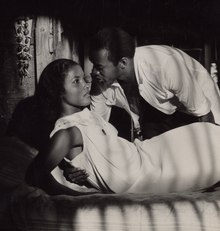Marpessa Dawn
Marpessa Dawn | |
|---|---|
 Dawn in 1959 | |
| Born | January 3, 1934 Pittsburgh, Pennsylvania, U.S. |
| Died | August 25, 2008 (aged 74) |
| Other names | Gypsy Marpessa Dawn Menor |
| Occupation(s) | Actress, singer, dancer |
| Years active | 1955–1995 |
| Spouse(s) | Marcel Camus (divorced) Georges-Eric Vander-Elst |
Marpessa Dawn (January 3, 1934 – August 25, 2008), also known as Gypsy Marpessa Dawn Menor, was an American-French actress, as well as a singer and dancer. She is best remembered for her role in the film Black Orpheus (1959).
Biography
[edit]

Born on a farm near Pittsburgh, Pennsylvania, of African-American and Filipino heritage,[1] she worked as a laboratory technician in New York before migrating to Europe as a teenager.[2]
She began acting in England, with some minor TV roles. Then, in 1953, she relocated to France and while occasionally working as a governess also sang and danced in nightclubs, where she met director Marcel Camus. At the age of 24, she won the role of "Eurydice" in his film Black Orpheus.[3] The film won the Palme d'Or at the 1959 Cannes Film Festival[4] and the 1960 Academy Award for Best Foreign Language Film.[5] She married Camus, but divorced him soon after and married Belgian actor Georges-Eric Vander-Elst, whom she met when they appeared together in a play at the American Centre in Paris. They had a civil ceremony held in secrecy. Considered a great beauty,[6] she was featured in November 1959 by Ebony along the likes of Alek Wek, Queen Latifah, Diana Ross, Dorothy Dandridge, Halle Berry, Vanessa A. Williams and Lena Horne".[7]
Dawn remained in Europe, working in French films and television. She also had several theatrical parts, including a starring role in Chérie Noire, a highly successful stage comedy which played for seven years, touring France, Belgium, Switzerland, Tunisia, Algeria and Morocco,[8] and Le Jardin des délices (The Garden of Delights), by Fernando Arrabal, with Delphine Seyrig (1969). Her subsequent career, however, was much less successful. She appeared in a 2005 documentary about Vinicius de Moraes, who wrote the original play from which Black Orpheus was adapted.
She and her fellow lead from that film, Brazilian actor Breno Mello, died just 42 days apart in 2008, both from heart attacks. They both starred in the 1959 film Black Orpheus. She was 74 years old at the time of her death in Paris and left five children and four grandchildren.[9]
Filmography
[edit]| Year | Title | Role | Notes |
|---|---|---|---|
| 1957 | Élisa | La négresse | |
| 1958 | The Woman Eater | Native Sacrifice Girl | |
| 1959 | Black Orpheus | Eurydice | |
| 1961 | El secreto de los hombres azules | Malika | |
| 1963 | Canzoni nel mondo | Herself | |
| 1966 | Au théâtre ce soir | French theater | Episode: "Cherie Noire" |
| 1970 | Le Bal du Comte d'Orgel | Marie | |
| 1971 | Traîté du rossignol | La femme du train | |
| 1973 | Bel ordure | La prostituée aux jouets | |
| 1974 | Sweet Movie | Mama Communa | |
| 1995 | Sept En Attente | (final film role) |
References
[edit]- ^ Dean, Loomis, "America's Dawn Comes Up in France", Life, March 14, 1960, p. 57.
- ^ Ebony 15, November 1959, p. 85.
- ^ Jane Margaret Laight, IMDb Mini Biography.
- ^ "Festival de Cannes: Black Orpheus". festival-cannes.com.
- ^ "The 32nd Academy Awards (1960) Nominees and Winners". oscars.org.
- ^ Tia Williams, "Great Beauty - Vintage Vamp: 'Black Orpheus' Star Marpessa Dawn", Essence, August 21, 2011.
- ^ Behn Cervantes, "Filipino blood ran in Marpessa Dawn’s multiracial roots" Archived April 7, 2013, at the Wayback Machine, Philippine Daily Inquirer, 04/09/2010. In fact, Dawn was not featured on Ebony′s cover, but on pages 85-90 of the November 1959 issue.
- ^ Dennis Hevesi, "Marpessa Dawn, Eurydice in the Film 'Black Orpheus', Dies at 74", The New York Times, September 26, 2008.
- ^ Frank Gray, Obituary of Marpessa Dawn and Breno Mello, The Guardian, 29 October 2008.
External links
[edit]- 1934 births
- 2008 deaths
- Actresses from Pittsburgh
- American expatriate actresses in France
- American film actresses
- American television actresses
- American actresses of Filipino descent
- Burials at Père Lachaise Cemetery
- 20th-century American actresses
- 20th-century African-American actresses
- 21st-century African-American actresses
- 21st-century American actresses
